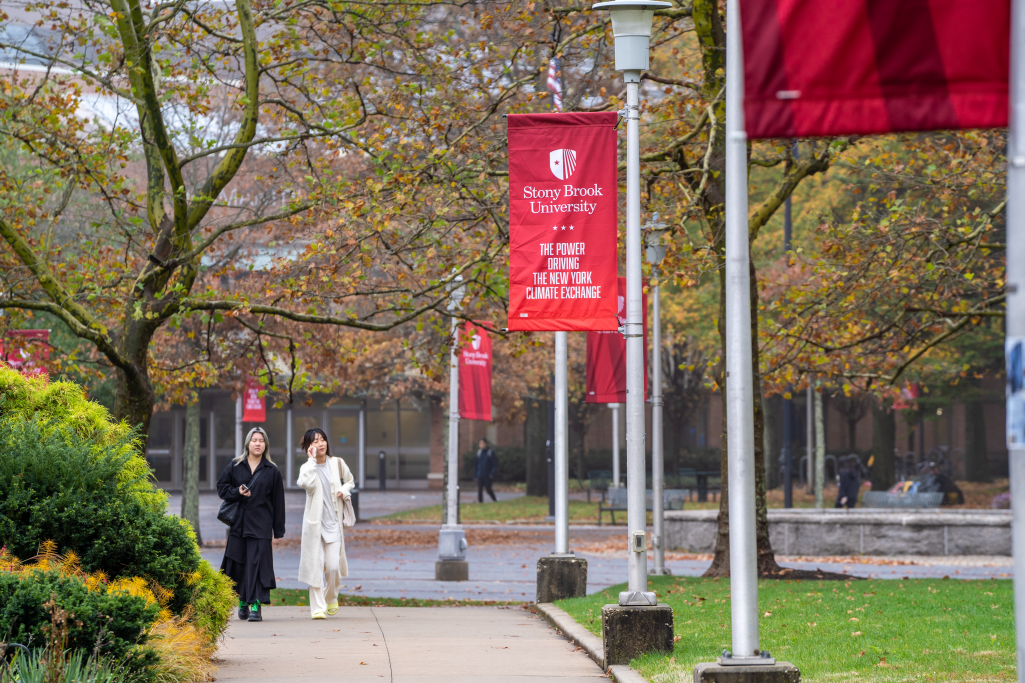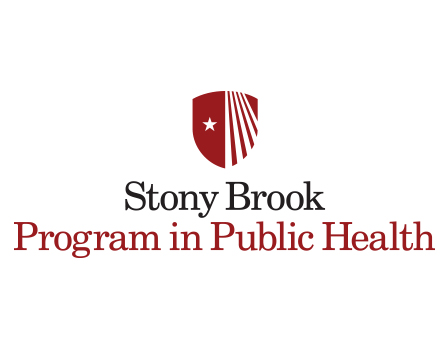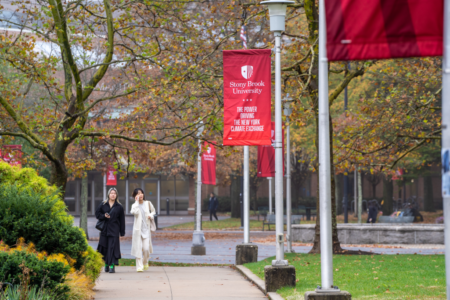The Programme in Public Health (PPH) at Stony Brook University, distinguished for its dedication to research excellence, provides students with a unique opportunity to learn from pioneers and innovators actively shaping the trajectory of public health outcomes.
Why does this matter? Consider global crises that have underscored the vital role of public health interventions. The ongoing COVID-19 pandemic has not only demonstrated the critical need for rapid, evidence-based responses but has also highlighted the significance of preventative measures and community engagement in safeguarding public health.
Several core and full-time faculty at Stony Brook knew this all along and have dedicated their careers to advancing research that can make an impact on policies and practices.

PPH students with their epi biostats posters Source: Stony Brook University
Professor Michele Bayley has spent decades trying to improve health outcomes for marginalised communities. On this mission, she has held senior-level positions in the public and non-profit sectors specialising in women’s health, sexual and reproductive health and health equity. Dr. Sean Clouston focuses on using algorithms to examine the role of long-term and chronic exposures in relation to ageing-related outcomes in old age. One of his ongoing projects seeks to examine social determinants of Alzheimer’s disease and related dementias.
Environmental epidemiologist Dr. Mahdieh Danesh Yazdi studies the relationship between air pollution, climate change, and human health. Dr. Alina Denham uses various advanced quantitative methods and large administrative healthcare datasets to address pressing policy questions and guide health policy. Her goal is to maximise access to health care and well-being of underserved individuals and families. Dr. Dylan Smith explores the use of social cognitive principles to study resilience and adaptation in the context of ageing-related disability and chronic illness.
These renowned researchers — many of whom are actively funded by the National Institutes of Health — double as educators, seamlessly breathing life into Stony Brook’s academic programmes. Dr. Smith leads the Master of Public Health (MPH) programme. Accredited by the Council on Education for Public Health (CEPH), it offers several concentrations: Community Health, Epidemiology and Biostatistics, Health Policy and Management and most recently, Climate Solutions and Health.

Melissa Thornton Source: Stony Brook University
Melissa Thornton chose the Epidemiology and Biostatistics route. Her decision to study at Stony Brook was fuelled by a thirst for knowledge and a recognition of its positive impact on Long Island’s community, both as an educational institution and a force in the field of medicine.
“The programme specifically stood out to me because of my awareness at the time of health’s association with quality of life (QOL),” she explains. “I have observed individual QOL to take on higher meaning when considering our communities QOL.”
So far, Thornton’s journey has been defined by a selection of courses that deeply resonate with her interests and career goals. Among her favourites are qualitative methods, applied biostats, epidemiology, social and behavioural determinants of health, and theories of health behaviour and communication. “There are others that I have yet to take, but I have an inkling that they too will soon be among my favourite course list!” says the part-time student, whose career is already taking shape.
Thornton is currently a grants coordinator at the PPH. Looking ahead, she envisions more growth and possibly another programme of study within Stony Brook — where options are endless.

PPH graduate Source: Stony Brook University
The PPH is also home to several dual degrees in collaboration with the Health Sciences Centre and other university departments, which is precisely what drew Mmutaka Ajulu-Okeke to the US from Nigeria.
“It offers a variety of combined degrees such as the Combined MBA/MPH, MPH/Master of Arts in Public Policy, Master of Social Work/MPH, etc. This holistic education style enables students like me to diversify our skills and perspectives, making us better equipped to drive change in an increasingly complex healthcare landscape,” she says
Perhaps what makes this student experience even more holistic is its emphasis on community engagement. For example, within the Stony Brook Medicine Health Libraries Programme, healthcare professionals and graduate student interns are working together to provide access to both in-person and virtual healthcare-related resources for public library patrons in Suffolk County.
Another prime example — Dr. Andrew Flescher established an internship programme through the United Network for Organ Sharing to provide students with firsthand exposure to living donors. It allows them to gain experience in conducting interviews with donors before their scheduled procedures at Stony Brook Hospital. The full list of faculty-led initiatives can be found here.
To find out what else the Programme in Public Health at Stony Brook University can do for your world-changing aspirations, click here instead.
Follow the Programme in Public Health on Facebook, X, Instagram and YouTube.













